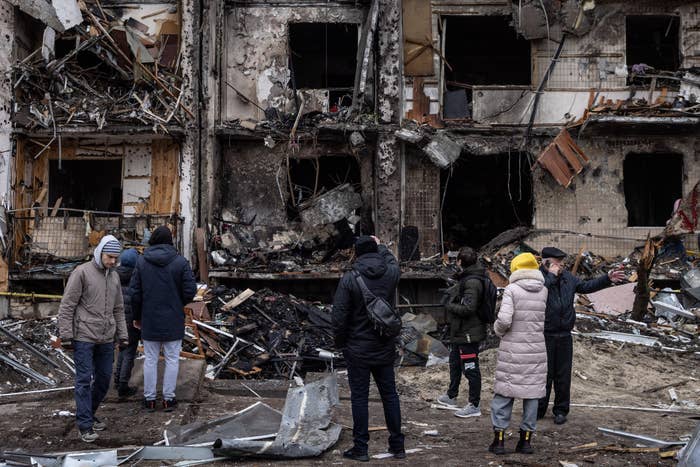
The International Criminal Court is investigating Russia for possible war crimes in its invasion of Ukraine and the conflict stemming from its annexation of Crimea eight years ago, the court's top prosecutor announced Monday.
Karim A.A. Khan, chief prosecutor for the ICC, said his office would proceed with its investigation "as rapidly as possible," noting that "there is a reasonable basis to believe that both alleged war crimes and crimes against humanity have been committed in Ukraine" since Russia's 2014 invasion of Crimea and eastern Ukraine.
He cited a 2020 report by his office that found there was justification to support the belief that crimes of willful killing, torture, and other violations of the court's statutes were committed during the occupation of Crimea. More than 14,000 people have been killed since the war started in spring 2014.
"Given the expansion of the conflict in recent days, it is my intention that this investigation will also encompass any new alleged crimes falling within the jurisdiction of my Office that are committed by any party to the conflict on any part of the territory of Ukraine," Khan said in a statement.
It's not yet clear how many Ukrainian civilians have been killed since Russia launched its deadly full-scale invasion of the country last week. Russian forces have attacked by air, land, and sea, sending missiles over major cities across the country, including in residential areas, and threatening the lives of millions. Hundreds of thousands of Ukrainians have fled the country, while those who remained sought safety in bomb shelters and subway systems or taken up arms to help defend their country. On Saturday, Ukraine's health minister, Viktor Liashko, said in a statement on Facebook that at least 198 Ukrainians, including three children, had been killed and more than one thousand others were wounded.
Igor Terekhov, mayor of Kharkiv, the second-largest city in Ukraine, said four people were killed when they left bomb shelters to get water and a family of five, including three children, was burned alive after a shell struck their car, the New York Times reported.
“Today showed that this is not only a war, it is the murder of us, the Ukrainian people,” Terekhov said, according to the Times. “This is the first time in its many-year history that the city of Kharkiv has been through something like this — shells that hit residential homes, killing and maiming innocent citizens.”
In a late-night video message on Monday, Ukrainian President Volodymyr Zelensky accused Russia of committing war crimes, noting that the strikes on Kharkiv amounted to the "deliberate destruction of people."
"Kharkiv is a peaceful city, there are peaceful residential areas, no military facilities," Zelensky said, adding that "the Russians knew where they were shooting."
As intense fighting raged on in Kyiv, the capital of Ukraine, Mayor Vitali Klitschko urged residents on Monday to spend the night in bomb shelters, saying, "Tonight will again be difficult," the Times reported.
Ukraine is not a party to the convention that established the ICC, which is charged with prosecuting crimes such as genocide that individual governments can’t or won’t, so it cannot refer the events to the office itself, Khan explained. However, the country has previously accepted the court's jurisdiction with respect to alleged crimes committed on Ukrainian lands since November 2013.
Khan said on Monday that he would also be asking parties to the convention and the international community as a whole to help fund his office's investigations.
"The importance and urgency of our mission is too serious to be held hostage to lack of means," he said, adding that he would continue to "closely follow developments on the ground in Ukraine, and again call for restraint and strict adherence to the applicable rules of international humanitarian law."
